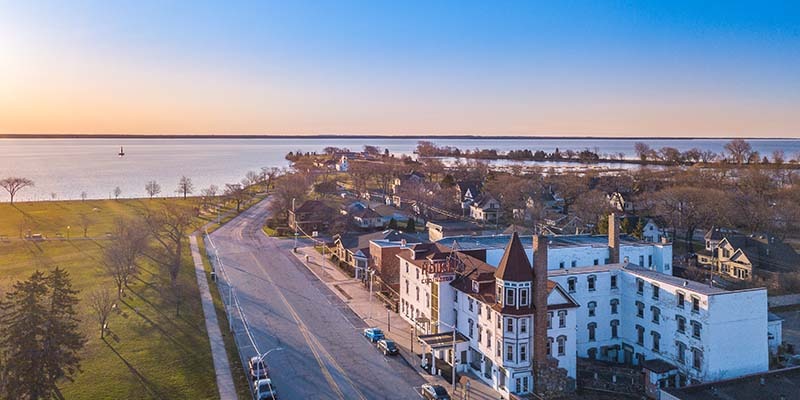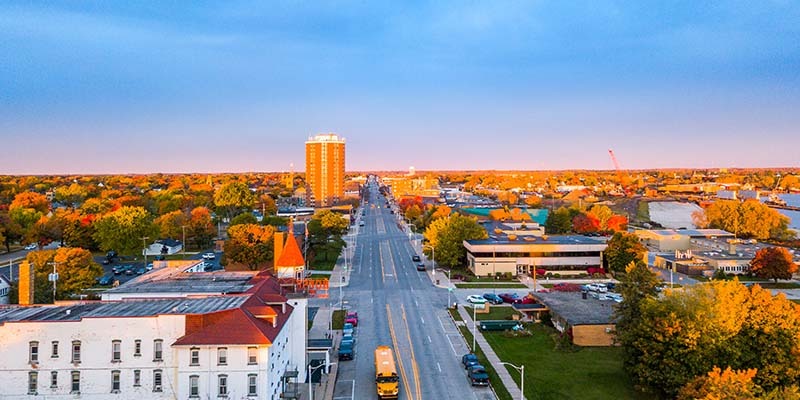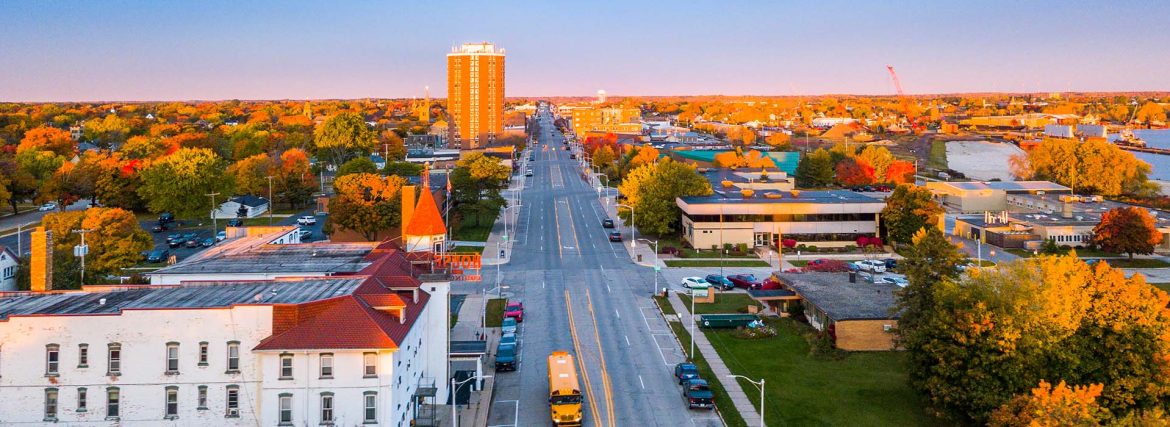Source: https://www.escanaba.org/ , Lake Michigan, Escanaba, Michigan
How strategic infrastructure spending and public-private partnerships are transforming this Upper Peninsula hub
Nestled along the shores of Lake Michigan, Escanaba, Michigan, is a small city with big ambitions. Known for its high quality of life and strategic location, the community is in the midst of a renaissance, driven by collaborative revitalization and forward-thinking leadership. City Manager James McNeil describes Escanaba as a place where residents can “live whatever life they choose,” thanks to its blend of natural beauty, recreational amenities, and economic opportunity.
 With a historic downtown undergoing a $20 million transformation, aggressive infrastructure investments, and a pro-business climate, Escanaba is positioning itself as a model for rural growth. As McNeil notes, “the opportunity is still very early,” and the momentum is undeniable.
With a historic downtown undergoing a $20 million transformation, aggressive infrastructure investments, and a pro-business climate, Escanaba is positioning itself as a model for rural growth. As McNeil notes, “the opportunity is still very early,” and the momentum is undeniable.
A Community Built for All
Escanaba’s appeal lies in its ability to cater to diverse lifestyles, whether for families, professionals, or retirees. McNeil emphasizes that the city “meets the needs of all categories uniquely well,” offering affordability, opportunity, and a welcoming pace of life. At the heart of this appeal is Ludington Park, which McNeil calls the city’s “crown jewel.” This sprawling public space along Lake Michigan features a bandshell, harbor, beach, and a network of trails, serving as both a recreational hub and a scenic anchor for the community.
Accessibility is another key advantage. Commutes are “extremely short,” and Escanaba’s proximity to regional airports, including its own like Delta County Airport, Iron Mountain – Ford, and Marquette – Sawer, and cities like Green Bay and Milwaukee ensures connectivity without sacrificing tranquility. “If you want to kind of live this life here where you have really high quality of life, perhaps a little bit slower life, but then you still want to go to these other cities you know, hop on an airplane. It’s very easy to do, it’s just wonderful,” McNeil explains.
Outdoor amenities further enhance the lifestyle. Upgraded neighborhood parks, a robust trail system, and premier golf courses cater to active residents, while Lake Michigan provides year-round natural beauty. The balance is clear, Escanaba offers the charm of a slower-paced community without isolation, making it a standout choice for those seeking both opportunity and quality of life.
Downtown Revitalization: A Hub of Investment
Escanaba’s historic downtown, spanning 23 blocks and dubbed the “longest small town downtown in Michigan,” is undergoing a strategic transformation. A $20 million streetscape project encompassing sanitary sewer, stormwater, and beautification upgrades is laying the groundwork for renewed economic vitality. “You can definitely feel the momentum,” says McNeil, noting that the investment extends beyond infrastructure to spur private development.
Key projects are reshaping the district’s future. The Lake Effect Distillery, housed in a historic bank building, will produce unique maple-based spirits, adding to the area’s entrepreneurial appeal. Nearby, the House of Ludington, a landmark property, is being revitalized, while The Northshore Flats introduces upscale condominiums for sale with Lake Michigan views. A standout project is the Hampton Inn, set to open in 2026 on the site of the former Delta County Jail.
The synergy between public and private investment is deliberate. “We’re seeing all sorts of private and public investment right in the downtown, and we’re seeing continued interest in additional projects kind of propagating here,” McNeil adds, underscoring downtown’s role as a catalyst for broader economic growth.
 Critical Infrastructure: Laying the Foundation for Growth
Critical Infrastructure: Laying the Foundation for Growth
Escanaba’s aggressive infrastructure strategy has positioned the city for sustainable expansion, with over $100 million invested since 2018, a move projected to double its net position within five years. “We’re seeing exponential growth,” says McNeil, noting that most projects are grant-funded, “most of it is being driven by infrastructure projects.”
A $60 million initiative is currently underway, allocating $20 million to wastewater upgrades and $40 million to drinking water infrastructure. Collaboration with the Michigan Department of Transportation (MDOT) ensures cost efficiency, with the city replacing underground utilities ahead of a planned highway reconstruction.
Resilience is a priority. Stormwater system upgrades address both current deficiencies and future demands. “We’ve done a study on our stormwater system and we knew there were some deficiencies, so we have this multi-phase plan and we have some funding in the works to get this work done,” McNeil explains. These improvements are not just reactive but proactive, with infrastructure rerouted or expanded to accommodate specific private developments.
The city’s approach underscores its commitment to business readiness. “I think we’re a city that’s very aware of what these private needs are and kind of recognize that you’re willing to invest in your infrastructure and be a willing partner for business investment, that really opens you up for opportunities that we have before us, but certainly for more opportunities tomorrow,” McNeil reflects.
By aligning public upgrades with private sector needs Escanaba ensures its growth is both strategic and scalable. This foundation is key to attracting and retaining businesses seeking shovel-ready opportunities.
Pro-Business Climate: Incentives and Partnerships
Escanaba has cultivated a business-friendly ecosystem through strategic incentives and collaborative partnerships. The city actively leverages tax abatements and Brownfield redevelopment tools, including TIF districts, to spur investment.
“We’ve been very pro-business as it relates to re-zonings to make projects happen, and financial incentives to make projects happen,” says McNeil. This flexible approach is complemented by direct engagement with the private sector. “We’ve grown our presence by working with partners to try and receive a little more input from the private world of what exactly is it that they need to hear from us or that they need to see us doing to be interested in doing work here,” McNeil explains, emphasizing the shift from bureaucratic processes to proactive dialogue.
Key partnerships amplify these efforts. State programs like Michigan EGLE’s SRF and federal American Rescue Plan funding have been instrumental in financing infrastructure upgrades. InvestUP, a regional advocacy organization, plays a critical role in promoting Upper Peninsula growth. “They’ve done a tremendous job of advocating for the interest of the UP and for business investment in the UP,” McNeil notes.
This multilayered support system, combining financial incentives, responsive governance, and regional collaboration, positions Escanaba as a compelling destination for enterprises seeking both opportunity and strategic alignment with public priorities.
Workforce Development and Economic Expansion
Escanaba’s economic pipeline reflects robust growth, with McNeil estimating a possibility of 350 new jobs projected in the next 18-24 months across expanding sectors. The city’s manufacturing legacy, historically resilient, is now transitioning into advanced manufacturing, a strategic evolution supported by targeted workforce development. “We definitely have the ability to retool our workforce for what the economy may provide us,” notes McNeil, highlighting the region’s adaptive potential.
Educational partnerships form the backbone of this transition. Bay College and Delta Schoolcraft Intermediate School District deliver cutting-edge Career and Technical Education (CTE) programs, creating a talent pipeline aligned with industry needs. These institutions collaborate closely with employers to ensure skills training meets current market demands.
Complementing workforce assets is Escanaba’s inventory of development-ready properties. Turnkey industrial and business park sites offer competitive advantages in both infrastructure and value. “We have land that I would consider turnkey, infrastructure ready, and I’m assuming at probably a better value than you may find in some more developed areas,” McNeil states, positioning the city as an attractive alternative to saturated markets. This combination of skilled labor availability and strategic site readiness creates a compelling value proposition for businesses evaluating expansion or relocation opportunities in the Upper Peninsula region.
Housing: Meeting Demand for Growth
Escanaba is addressing its housing needs with a mix of strategic developments to support its growing economy. Leading the charge are The Flats on Ludington, a market-rate condominium and apartment project offering premium lake views. Additional multi-family and single-family developments are in various stages of progress, responding to increased demand from both residents and incoming workforce.
While housing prices have risen, the city remains comparatively affordable. “I would still say in Delta County, you can probably find housing still a bit more affordable than you can in other places in the country, but we are actively seeking a growth in housing supply,” notes McNeil.
However, with hundreds of new jobs projected, expanding inventory, particularly workforce housing, has become a priority. “I believe very firmly, especially with the job growth interest that we’re seeing here, that we’re going to have a demand for several hundred units beyond what we’re hoping can get built in the next several years,” McNeil emphasizes. “If these economic development projects are going to happen, certainly workforce [housing] is going to be a big part of that.”
By fast-tracking projects and incentivizing development, Escanaba aims to ensure its housing supply keeps pace with its economic ambitions.
 The Road Ahead
The Road Ahead
For McNeil, Escanaba’s transformation reflects both hometown pride and disciplined execution. “Working for the public for me, it being my hometown too, is certainly very rewarding,” he shares.
Looking ahead, the city’s priorities remain sharply focused, driving employment growth and expanding housing supply to sustain momentum. “Ultimately, our philosophy is that private investment has to support our public investment long term,” McNeil explains. This includes proactive outreach to attract new industries and entrepreneurs while maintaining fiscal responsibility. With infrastructure in place and partnerships flourishing, Escanaba is positioned not just to grow, but to create lasting economic resilience.
“We’re only in maybe the second or third inning of this kind of renaissance in our area,” observes McNeil, underscoring the untapped potential for businesses and investors. From workforce housing initiatives to turnkey development sites, Escanaba combines Midwestern values with strategic execution, offering both immediate opportunities and long-term growth prospects. For enterprises seeking competitive advantages in an authentic community, Michigan’s Upper Peninsula now presents a compelling proposition.
AT A GLANCE
Who: City of Escanaba
What: A rural-urban hub leveraging $100M+ in infrastructure upgrades, workforce development, and public-private partnerships to fuel economic expansion
Where: Delta County, Michigan’s Upper Peninsula
Website: https://www.escanaba.org/
PREFERRED VENDORS/PARTNERS

C2AE is an Architecture and Engineering firm with 8 offices and 135 employees across Michigan and New York State. As the world moves rapidly forward, we help clients navigate the current with straightforward and enduring solutions. Through underground infrastructure, surface transportation, buildings, and a combination, we empower communities to envision the world to come.
C2AE : c2ae.com

The Delta County Chamber has supported business interests for over 100 years! Being a community leader fostering a healthy business environment. The EDA supports the vision that attracts and grows businesses, while attracting talent. Visit Escanaba shares the wonderful places & events to visit in Delta County throughout the year.
The Delta County Chamber: www.deltaeda.org


